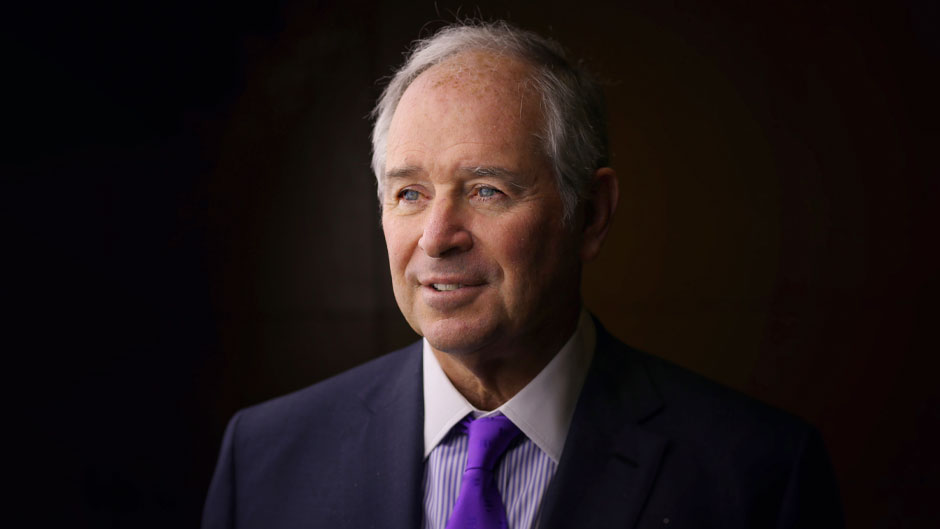More than 1,000 viewers from 35 countries registered for and attended the virtual lecture on Thursday evening featuring Stephen A. Schwarzman, CEO, chairman, and co-founder of the global investment firm Blackstone, who talked about the economy, the role of entrepreneurs, and the current trade relationship between the United States and China.
Part of the University of Miami Patti and Allan Herbert Business School Cobb Leadership Lecture, Schwarzman’s talk addressed questions posed by alumna Alice Vilma and former U.S. Ambassador Charles Cobb, a senior member of the University’s Board of Trustees, whose impressive résumé includes former businessman, entrepreneur, and benefactor of the lecture series.
Schwarzman co-founded Blackstone in 1985 and guided it to its current wealth of close to $600 billion in assets. He is also among the world’s most generous philanthropists, having donated more than $1 billion to transformational projects—especially in education and the arts at several universities.
“I’ve always been motivated seeing the opportunity in something that doesn’t yet exist, seeing it as something big and a powerful idea that’s going to make a change and be remarkable,” said Schwarzman. “I think it’s in my DNA. And if your vision is right, you’re going to make it something wonderful that will excite and recruit people—it’s a virtuous circle.”
Schwarzman’s vision has often proved right: Blackstone is currently the largest owner of property in the world and a global leader and major provider of credit for small, middle-market, and other companies. Most recently, the firm has invested in life sciences, warehousing, and online shopping technologies.
“We’ve taken advantage of changes in society that were happening before COVID-19 and that have now been accelerated,” he said. “It sounds a bit too prescient, but we started 10 years ago selling our shopping centers and purchasing warehouse space, a critical part of the supply chain for online sales.”
Yet his business vision took a while to get focused. Schwarzman shared a range of anecdotes from his 2019 book, “What It Takes: Lessons in the Pursuit of Excellence,” charting the trials and tribulations early in his career. “You fail a bunch, and you have to learn from those failures and face them,” he said. “You can’t make pretend they didn’t happen.”
Schwarzman credited his high school track coach with helping to shape his approach to entrepreneurship and to management through rigorous training, fostering teamwork, and with fueling his persistence and stamina.
“Coach Jack Armstrong had a lovely level-headed way of encouraging us, of taking everybody to the limits of their capabilities and treating them with dignity,” said Schwarzman, a sprinter at the time. The team excelled, winning state championships and beyond.
“Being in the hands of somebody who’s truly amazing makes all the difference,” he said. “And when the roles are reversed, and we each go into our own fields of endeavor, then training people, teaching them, and making sure they’re ready is really part of our role as managers and entrepreneurs.”
Cobb, a former undersecretary of commerce, asked if Schwarzman could be the white knight who might work to resolve the intensified conflict between China and the U.S., the world’s two great economic powers.
Schwarzman has extensive relations with China through his global philanthropy projects that include the creation of a Rhodes-type scholarship program—the Schwarzman Scholars, at Tsinghua University in Beijing, which serves to educate future leaders about China.
In responding to Cobb, the CEO shared details from several of his conversations with Chinese President Xi Jinping and his role in advising the current U.S. administration.
“Now the two countries, which together account for 40 percent of the world economy, are in a very bad place over technology and trade, although the trade is not so bad,” Schwarzman said. “I think the Chinese realize now that this is going into a really bad place that’s a bad outcome for them, but also for the world and the U.S. We are going to have to find some solutions, and this is going to have to be addressed and made right in a more serviceable area than we are today.”
In terms of the economic landscape caused by the pandemic, Schwarzman emphasized that the scenario was radically different from anything the country has ever experienced before.
“Nobody knew what was going to happen, except that it was going to be terrible—it had to be,” he said, adding that without the stimulus packages and the “heroic liquidity injections” of the Federal Reserve Board, we would be facing a depression.
“To get out of this one and be equitable we’re going to have to find a way to make sure everybody in society is educated,” he said.
Schwarzman said that real economic adjustments are called for, yet they won’t be easy.
“We’re going to have to make changes to our economy, but it won’t be as simple as you think, because there are forces that don’t want to change,” he said. “Yet they have to change for the goodness and the cohesion of the society.”

